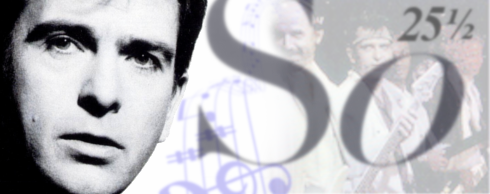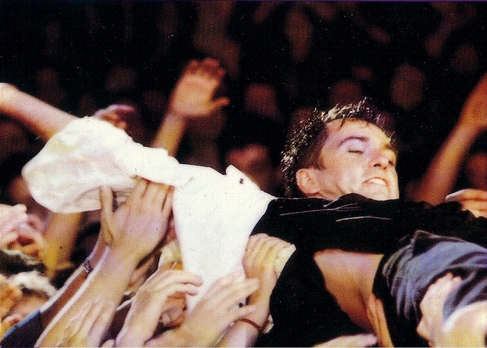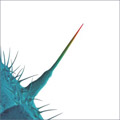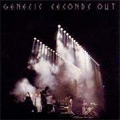


The concert film P.O.V. (Point Of View) came out three years after the end of the So tour. Fans had long been hoping for it to be released on DVD/Blu-ray. Such a release had been announced several times, but it never happened. Finally, for the 25th anniversary of So the film was included on DVD in the So25 Deluxe Edition, and, to everybody's surprise, also as 2CD set.
Twice before has Gabriel released a live album at the same time as the corresponding concert film: For Secret World Live (1994) and for New Blood Live In London (2012). Both times the quality and the amount of sense that made varied. Let us see what it is with Live In Athens.
First of all it is evident that this is a spin-off off the film. Some aspects of the live album will probably be explained when film and album are compared. At the time this article is published the DVD is as yet unavailable. We will add any new insights that pertain to it here.
The new mix
The film has originally come out on an analogue medium, and 22 years ago to boot, so that it became necessary to re-work it by using modern means. Ben Findlay has done the new sound mix. It shows that the audio is much more detailed than the P.O.V. mix. Many details stand out much clearer, be it the guitars or the various drum sounds. There have been frequent shifts between the old and the new version as to which instrument is in the focus. This means that surprisingly, Tony Levin's bass playing moves further to the background. Still, the mix is enormously strong, and it rocks with energy. At times it also seems a bit fiddly. And it does not do without the usual Gabrielian reworkings and additions, so one cannot really call it a pure live sound. On the one hand the arrangements sound compact throughout, but on the other hand it takes away from the immediacy. Gabriel's voice is frequently mixed without echo, and the audience ambience has also been reduced. All in all there is less warmth than in P.O.V. and a drier atmosphere. Gabriel's vocals, however, seem to be unchanged from the original film, whether that had been re-worked or not.
The Band
Gabriel assembled a virtuoso live band for the So tour (also known in parts as the This Way Up tour). Unmistakable and intense is the playing of the old hands David Rhodes (guitar) and Tony Levin (bass). Manu Katché was new at the drums; he brought a percussive style into the musical structure which both loosened the music and drove it forwards. David Sancious, the new man at the keyboards, is given much space he uses for little elegant playful bits that enrich the song. Small wonder that Gabriel wanted to reunite this line-up for the So jubilee. His own voice on Live In Athens is at an all-time peak of strength and expressiveness.

The album and the individual tracks
The beginning excepted, Live In Athens follows the original set list. Four songs were added that were not present on P.O.V. Both decisions are very pleasing. The recording now appears to be a normal concert event.
Comparisons always refer to the original release of P.O.V. on VHS video cassette. Occasionally other official releases will be referred to (Mercy Street, for example could already be heard on a 1994 live EP) as will some inofficial (soundboard) recordings. Last not least the reviewer still remembers his own concert experience.
This Is The Picture (Excellent Birds)
It is good to hear the song completely (as opposed to P.O.V., where it was shortened as an intro). Remarkably, it is still in the beginning, whereas it was played in the middle in the actual concert. The film may reveal why this is so – after all the first thing we hear is the sound of a rewinding tape, and that is likely to be linked with an image. This Is The Picture illustrates nicely how many new details can be heard on the album, as all kinds of instruments make themselves known. The whole song is quite groovy.
San Jacinto
The mix grips the listener more than the P.O.V. original, which is also due to a stronger bass in the mix. There are no additions to the sound, only the echo effects in Gabriel's vocals towards the end remind one of current habits on New Blood. The basic sample loop has been modified and adapted to the studio version, but it has not been the original live one either on P.O.V.
Shock The Monkey
The rhythm track has been refreshed, fortunately in a tasteful and careful way. The recording contains one of the strongest live versions of the song; it really has a restless drive. David Sancious' occasional keyboard fills are simply brilliant and lend the song a jazzy note.
Family Snapshot
The first of the four songs that have been unpublished. The intro sounds big, with lots of echo. Gabriel's e-piano was extended by a synth layer that was not there in the live show. The song seems to have been played slower than usual. All this gives the song a well-becoming solemnity. Pity we did not get to hear it until now.
Intruder
Straight on to the next new song. What is this, though? Intruder has considerable impetus and appears to be played a bit faster than unsual – but the drum sound has actually been carried over from the studio version! In the middle of the instrumental section there seems to be a cut from one performance to another: The speed wavers very slightly, but noticably. Later the audience clap into the quiet ending in a rather annoying and ignorant fashion. They want to party. Actually, the song does take speed out of the show – despite the extreme tension in the song. There are reasons why Gabriel played the song only occasionally live, e.g. when they played several nights in one place, as a sort of treat for people who saw all shows. Its entertainment value in this recording is, however, limited.
Games Without Frontiers
Thanks to a new interlude that is probably owing to David Sancious this is a great song even in the new mix. The synthetic babbling of the studio version has been turned into a full-blown rock/pop number. You also feel how serious Gabriel is about the topic he addresses in the song and the announcement. The closing section of „no more war“ is a very intense moment in this respect. The new album mix does not change anything about that, and that is a good thing.
No Self Control
This sounds very different from the studio version and resemble the rendition on Plays Live. David Sancious adds a clever groove to the central motive and Manu Katché adds some tricky rhythms – the result is extremely intelligent and nightmarish. Mix and arrangement have not been changed so the culmination in the middle part is included in full force.
Mercy Street
This has been fiddled with. The synth waves in the beginning waver in stereo; a jarring effect, particularly when you listen through headphones. The echo in the vocals has been reduced while the voice has been strangely moved to the fore which takes away from the overall effect. It all sounds very polished. The guitar is much more present in the long improvisation towards the ending, but the bass is not, and so the gloom is missing. The basic rhythm loop continues throughout; apparently someone has lost the courage to leave out things. The closing section that used to be Tony Levin's big moment and overwhelming in its nightmarish gloom has lost much of its effect.
The Family And The Fishing Net
The third new song. Fierce and gripping right from the beginning, it exudes bleakness. The vocals are rather dry in the mix, as if they came from the studio. Echos are only used for special moments. Some new effects that were not in the live performance have been added. A fine rendition all in all, and a good thing we finally get to hear this recording.
Don't Give Up
The remarkable thing about this live version is that Gabriel sings all parts himself. There is no one to counter him. Only towards the end some female sampled voices come in, but they stay even more in the background than before. The version from this tour has never been a very special one – it neither profits nor loses from the new mix. David Rhodes offers a fine, subtle solo. He does not get permission to do that anymore.
Solsbury Hill
The 1987 version of Gabriel's classic has never been outstandingly original; it drifts along on the river of routine. The new mix has more grip and more spine, particularly because we now hear Manu Katché's drums better. The song has gained more groove and really gets going for the finale.
 Lay Your Hands On Me
Lay Your Hands On Me
The intro layer has the wavering stereo effect again, and the vocals are rather dry in the mix. This detracts from the atmosphere. The drums are not as much in the fore as usual. The long closing section in which Gabriel lets himself fall onto the hands of his audience is two minutes shorter than on P.O.V. Let us hope that is not so in the film. Apart from that the song is as convincing as ever.
Sledgehammer
Why the groovy instrumental intro was cut from P.O.V. is simply beyond me. Gabriel would repeat this outrage on the Secret World Live double album. The cut remains on this album, and more so: On P.O.V. you could hear the last bars of the intro – they have gone here. Remarkably, the unusual horn sample has not been removed in the new mix. It is quite thin, but lends the version a special charme. This first live production of Gabriel's biggest hit is quite lively in the new mix and really swings towards the end.
Here Comes The Flood
The fourth and last of the unheard songs is a bit of a disappointment. On the tour Gabriel would only play a short form of the songs consisting of the first two verses and the chorus. That is the way it appears here and so it is neither fish nor fowl. An unaccustomed ethereal sound has been added to the piano sound that was not there during the live performance. It adds an unnecessarily melodramatic moment. The simplicity and the 'open space' vanish, the quiet cannot breathe, as it were, and the following song has simply been tacked on to it.
In Your Eyes
Here is the original live version of In Your Eyes, the version Gabriel has been reproducing ever since. It is powerful and fresh, and it has the incredible voice of Youssou N'Dour. But the mix has clearly been tampered with. The famous guitar lick has had some echo added, so it now seems slightly delayed and not at straight as it used to. David Sancious' wonderful brief solo has been brought closer to the original stage version, but muddled a bit. It does not really matter that the version is a minute shorter than P.O.V. What has been cut were only repetitive things or musically unimpressive things like the boisterous dance of the band. May it not be missing in the film.
Biko
This song was extremely relevant in 1987 – after all, South Africa rid themselves from Apartheid only in 1994. So the audience participation is still meaningful during the closing section. The drums that play such a central role in this song are strong and powerful (and re-worked). The African drums played by the members of Youssou's band are slightly more in the background. The ending seems a bit clumsy, though. The music breaks off very suddenly, and then there is a minute of frenetic applause. Is this from the end credits of the film?
At this point we should also explain about the peculiar word Gabriel uses several times between songs: efcharisto is Greek and means – you guessed it - „thank you“.
All in all
The album has a good overall sound, though the atmosphere sometimes suffers a bit from various alterations. The track list is good for the most part. The musical quality of the recording is impressive, thanks to the outstanding band. And because that is so it does make sense to offer this show as an audio album. It is available in the So25 Special Edition 3CD set and without the DVD which is a blessing for all those who cannot get themselves to buy the So25 Deluxe edition. This concert recording should be in everybody's collection.
by Thomas Schrage, English by Martin Klinkhardt



The return favour album: Peter Gabriel's songs are covered by other artists.



Some say it is one of the best Live-Albums ever. Genesis' Seconds Out became a milestone and also marked the end of the classic years.